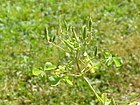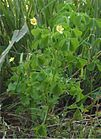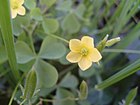Note: This is a project under development. The articles on this wiki are just being initiated and broadly incomplete. You can Help creating new pages.
Difference between revisions of "Oxalis stricta - Lemon clover"
(→Uses) |
|||
| (8 intermediate revisions by 2 users not shown) | |||
| Line 1: | Line 1: | ||
[[File:6h common yellow oxalis.jpg|thumb|right|''Lemon clover'', ''Oxalis stricta'']] | [[File:6h common yellow oxalis.jpg|thumb|right|''Lemon clover'', ''Oxalis stricta'']] | ||
| − | + | '''Lemon clover''' is an herbaceous plant native to North America, parts of Eurasia, and has a rare introduction in Britain. It tends to grow in woodlands, meadows, and in disturbed areas as both a perennial and annual. | |
| − | '''Lemon clover''' | ||
| − | |||
==Uses== | ==Uses== | ||
| − | {{Uses| | + | {{Uses|Fever}}, {{Uses|Stomach cramps}}, {{Uses|Nausea}}, {{Uses|Swellings}}, {{Uses|Liver problems}}, {{Uses|Indigestion}}, {{Uses|Wounds}}, {{Uses|Swollen gums}}. |
==Parts Used== | ==Parts Used== | ||
| − | {{Parts Used|Flowers}}, {{Parts Used|Leaves}}, {{Parts Used| | + | {{Parts Used|Flowers}}, {{Parts Used|Leaves}}, {{Parts Used|Roots}}, {{Parts Used|Seeds}} |
==Chemical Composition== | ==Chemical Composition== | ||
| Line 36: | Line 34: | ||
==Identification== | ==Identification== | ||
===Leaf=== | ===Leaf=== | ||
| − | {{Leaf|Simple| | + | {{Leaf|Simple|Alternate|Each leaf is divided into three heart shaped leaflets the point of the leaf toward the stem and the notch outward in the manner of a clover leaf}}<ref name="Leaf"/> |
===Flower=== | ===Flower=== | ||
| Line 42: | Line 40: | ||
===Fruit=== | ===Fruit=== | ||
| − | {{Fruit| | + | {{Fruit|Simple|7–10 mm |An elongated capsule||Many}} |
===Other features=== | ===Other features=== | ||
==List of Ayurvedic medicine in which the herb is used== | ==List of Ayurvedic medicine in which the herb is used== | ||
| − | |||
==Where to get the saplings== | ==Where to get the saplings== | ||
| Line 57: | Line 54: | ||
==Commonly seen growing in areas== | ==Commonly seen growing in areas== | ||
| − | {{Commonly seen| | + | {{Commonly seen|Woodlands}}, {{Commonly seen|Meadows}}, {{Commonly seen|Growing in abandoned fields}}. |
==Photo Gallery== | ==Photo Gallery== | ||
| Line 75: | Line 72: | ||
<references> | <references> | ||
| − | <ref name="chemical composition">[http://ijpsr.com/bft-article/phytochemistry-and-pharmacology-of-oxalis-corniculata-linn-a-review/?view=fulltext | + | <ref name="chemical composition">[http://ijpsr.com/bft-article/phytochemistry-and-pharmacology-of-oxalis-corniculata-linn-a-review/?view=fulltext Phytochemistry]</ref> |
| − | <ref name="Leaf">[http://2bnthewild.com/plants/H279.htm | + | <ref name="Leaf">[http://2bnthewild.com/plants/H279.htm Plant description]</ref> |
| − | <ref name="How to plant/cultivate">[https://www.pfaf.org/user/Plant.aspx?LatinName=Oxalis+stricta | + | <ref name="How to plant/cultivate">[https://www.pfaf.org/user/Plant.aspx?LatinName=Oxalis+stricta Cultivation details]</ref> |
</references> | </references> | ||
| Line 90: | Line 87: | ||
[[Category:Herbs]] | [[Category:Herbs]] | ||
| + | [[Category:Oxalidaceae]] | ||
Latest revision as of 12:37, 11 June 2020
Lemon clover is an herbaceous plant native to North America, parts of Eurasia, and has a rare introduction in Britain. It tends to grow in woodlands, meadows, and in disturbed areas as both a perennial and annual.
Contents
- 1 Uses
- 2 Parts Used
- 3 Chemical Composition
- 4 Common names
- 5 Properties
- 6 Habit
- 7 Identification
- 8 List of Ayurvedic medicine in which the herb is used
- 9 Where to get the saplings
- 10 Mode of Propagation
- 11 How to plant/cultivate
- 12 Commonly seen growing in areas
- 13 Photo Gallery
- 14 References
- 15 External Links
Uses
Fever, Stomach cramps, Nausea, Swellings, Liver problems, Indigestion, Wounds, Swollen gums.
Parts Used
Chemical Composition
Methanolic and ethanolic extracts of this plant show the presence of carbohydrate, glycosides, phytosterols, phenolic compounds, flavonoids, proteins (12.5%), amino acids and volatile oil[1]
Common names
| Language | Common name |
|---|---|
| Kannada | |
| Hindi | |
| Malayalam | |
| Tamil | |
| Telugu | |
| Marathi | NA |
| Gujarathi | NA |
| Punjabi | NA |
| Kashmiri | NA |
| Sanskrit | |
| English | Yellow Wood Sorrel |
Properties
Reference: Dravya - Substance, Rasa - Taste, Guna - Qualities, Veerya - Potency, Vipaka - Post-digesion effect, Karma - Pharmacological activity, Prabhava - Therepeutics.
Dravya
Rasa
Tikta (Bitter), Kashaya (Astringent)
Guna
Laghu (Light), Ruksha (Dry), Tikshna (Sharp)
Veerya
Ushna (Hot)
Vipaka
Katu (Pungent)
Karma
Kapha, Vata
Prabhava
Habit
Identification
Leaf
| Kind | Shape | Feature |
|---|---|---|
| Simple | Alternate | Each leaf is divided into three heart shaped leaflets the point of the leaf toward the stem and the notch outward in the manner of a clover leaf |
Flower
| Type | Size | Color and composition | Stamen | More information |
|---|---|---|---|---|
| Unisexual | 1.3cm wide | Yellow | 5-20 | Flowers Season is June - August and Blooms first appear in mid spring and continue into early fall |
Fruit
| Type | Size | Mass | Appearance | Seeds | More information |
|---|---|---|---|---|---|
| Simple | 7–10 mm | An elongated capsule | Many | {{{6}}} |
Other features
List of Ayurvedic medicine in which the herb is used
Where to get the saplings
Mode of Propagation
How to plant/cultivate
Easily grown in a sandy soil in a warm dry position[3]
Commonly seen growing in areas
Woodlands, Meadows, Growing in abandoned fields.
Photo Gallery
References
External Links
- Ayurvedic Herbs known to be helpful to treat Fever
- Ayurvedic Herbs known to be helpful to treat Stomach cramps
- Ayurvedic Herbs known to be helpful to treat Nausea
- Ayurvedic Herbs known to be helpful to treat Swellings
- Ayurvedic Herbs known to be helpful to treat Liver problems
- Ayurvedic Herbs known to be helpful to treat Indigestion
- Ayurvedic Herbs known to be helpful to treat Wounds
- Ayurvedic Herbs known to be helpful to treat Swollen gums
- Herbs with Flowers used in medicine
- Herbs with Leaves used in medicine
- Herbs with Roots used in medicine
- Herbs with Seeds used in medicine
- Herbs with common name in English
- Habit - Herb
- Index of Plants which can be propagated by Seeds
- Index of Plants which can be propagated by Cuttings
- Herbs that are commonly seen in the region of Woodlands
- Herbs that are commonly seen in the region of Meadows
- Herbs that are commonly seen in the region of Growing in abandoned fields
- Herbs
- Oxalidaceae









